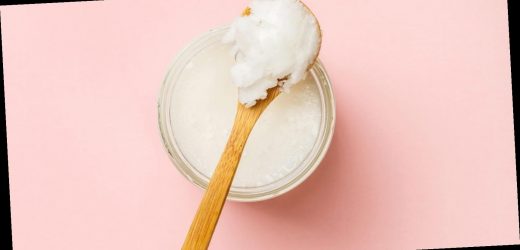It’s the kitchen cupboard staple that many swear by but is coconut oil actually good for your skin? We asked the experts to weigh in…
From turmeric to aloe vera, avocado to lemon juice, there are a lot of natural ingredients we call upon for their beauty benefits. But there’s no kitchen cupboard staple more popular than the trusty tub of coconut oil. Used for a myriad of beauty hacks, from a gentle all-natural cleanser to a nourishing face mask ingredient, coconut oil has become a large part of many people’s natural beauty routines.
But is coconut oil good for your skin? While it might make for a seriously skin-softening body oil, coconut oil is one of the most polarising skincare ingredients out there. So we called upon the experts to weigh in. Here are some things you should know before slathering coconut oil onto your complexion…
Is coconut oil a good moisturiser?
“Coconut oil is rich in fatty acids and saturated fats,” says Dr Ifeoma Ejikeme, Medical Consultant and Founder of Adonia Medical Clinic. “Some studies have shown virgin coconut oil to be helpful in moderate to severe dry skin as it can help to increase fibroblast production, collagen synthesis and also promote wound healing.”
But not all coconut oil is made equally. “Coconut oil can come in many forms and each carries different properties,” Dr Ejikeme continues. “Cultured coconut extracts have been shown to have anti-inflammatory properties and can also increase collagen synthesis, both of which can help with the barrier function of the skin.”
So does coconut oil make for a good moisturiser? In simple terms, yes. Your skin barrier helps to limit transepidermal water loss (water evaporating from your skin) and so a strong functioning skin barrier means that less water is lost, allowing hydration and moisture to be trapped into the skin.
Coconut oil is also absorbed quickly into the epidermis meaning your skin is left feeling soft and hydrated (rather than greasy) making it a popular choice when it comes to moisturising your body.
There are other benefits too. “After human breast milk, coconut oil contains the highest amount of lauric and caprylic acids in nature,” says Rose-Marie Swift, founder of RMS Beauty. “Lauric acid is anti-fungal, antibacterial and antimicrobial as well as anti-viral. It’s also a natural antioxidant, which helps against free radical damage (otherwise known as premature aging) and also contains high levels of vitamin E.”
Is it OK to use coconut oil on your face?
With so many skincare benefits, it’s easy to see why people reach for coconut oil to help nourish their complexion. But should we be using coconut oil on our face?
“The key thing to note is that most of the studies surrounding coconut oil show their effects on dry skin or those with dermatitis,” explains Dr Ejikeme.
“In reality, whether you should use coconut oil on your face really depends on the coconut oil formulation you’re using and on your skin type.
If you have acne prone skin, I would advise you avoid using coconut oil on your face, chest, shoulders and back. Essentially all the areas which are prone to breakouts. I see people daily in my clinic noticing significant breakouts after using coconut oil on their skin and this is usually because someone has oily or acne prone skin.”
Is it OK to use coconut oil on your body?
“For many people, the skin on their body is drier than the skin on their face, meaning the temptation to use coconut oil on their body might be greater,” says Dr Ejikeme.
“I would still advice caution on the chest, back and shoulders in those people with acne prone skin.”
Dr Ewoma Ukeleghe, cosmetic doctor and founder of Skndoctor agrees. “Coconut oil is fine for use on areas like your arms or legs as these often have less oil glands than the face and scalp. If you really want to use coconut oil I would definitely say to save it for your body rather than your face.”
Is coconut oil comedogenic?
The issue many skin experts have with using coconut oil on the skin, is that it’s highly comedogenic meaning it can block pores and lead to blemishes and congestion.
“Coconut oil is highly comedogenic meaning it can clog pores,” says Dr Ukeleghe. “I would definitely avoid using coconut oil if you are prone to breakouts and black heads as this is likely to exacerbate your skin issues. Complexions that struggle with excess sebum regulation really don’t need any extra oil and it’s likely to make problems worse”.
People who are prone to getting spots may find that coconut oil will cause breakouts due to its highly occlusive texture.
Consultant Dermatologist Dr Anjali Mahto agrees. “Applying oils on the skin can promote the formation of blackheads leading to spots. Coconut oil is highly comedogenic so I’d avoid it if you’re prone to breakouts and blackheads.”
What is the best coconut oil?
While the coconut oil sold on our supermarket shelves might seem uncomplicated, it can come in many forms.
Traditionally, hand-pressed coconut oil is most common and is made by grinding and pressing fresh coconut into coconut milk.Unfortunately, processing involves heat and can deplete the lauric and caprylic acid and reduce the antioxidant, vitamin, enzyme and healing capacity of the oil.
“The best extraction method is using a cold-centrifuge,” advises Swift. “This means that the product is processed without heat and makes a truly raw product with all the healing nutrients left 100% intact.”
While coconut oil might not be suitable for everyone’s skin, there’s definitely a place for it within our beauty routines. When shopping for the best coconut oil, look for formulas that are pure and raw, and avoid any that contain additives or fillers as these might irritate your skin.
RMS Beauty Raw Coconut Cream
Shop RMS Beauty Raw Coconut Cream at Space NK, £17
Buy now
Vita Coco Extra Virgin Cold Pressed 100% Raw Coconut Oil
Shop Vita Coco Coconut Oil at Boots, £9.99
Buy now
Kiki Health Organic Raw Virgin Coconut Oil
Shop Kiki Health Organic Coconut Oil at Cult Beauty, £13.95
Buy now
Kopari Beauty Organic Coconut Melt
Shop Kopari Beauty Organic Coconut Melt at Cult Beauty, £17
buy now
What are the best uses for coconut oil?
Body moisturiser
While coconut oil might not be recommended for use on the face (especially if you have blemish prone skin) it does make for a brilliant body moisturiser. Apply straight from the bath or shower and let the heat from your body melt the balm into your skin.
Make-up remover
Coconut oil helps to break down lipid-soluble impurities like make-up and sebum meaning it can actually be used as a great make-up remover. However it’s important to carry out a second cleanse to cut through the oil and rinse away any residue, that might lead to blocked pores.
Brush cleaner
For the same reasons as above, coconut oil is a brilliant brush cleanser. Not only does it break down make-up like a dream, it conditions the brush bristles leaving them super soft.
Body scrub
If you’re making your own at-home body scrub, coconut oil is the perfect ingredient for your scrub’s base. When mixed with sea salt or sugar, the coconut oil acts as the scrub’s emollient, allowing your skin to be nourished and moisturised while you exfoliate.
Cuticle oil
Thanks to coconut oil’s deeply moisturising properties (combined with its antibacterial benefits) the cupboard staple makes for the perfect nourishing cuticle oil.
Hair protectant
Apply a dollop of coconut oil to your hair before swimming in the ocean or chlorine-treated swimming pool to protect your hair from any drying effects. It acts as a barrier against your hair and the water, shielding your hair and repelling any negative side-effects from the chlorine, salt or sun.
Deep conditioner
Coconut oil is a brilliant deep conditioning treatment for hair as it nourishes and smooths dry and damaged strands. Apply overnight or as a pre-shampoo treatment to deeply condition and soften dry, brittle hair.
Main image: Getty
Source: Read Full Article


